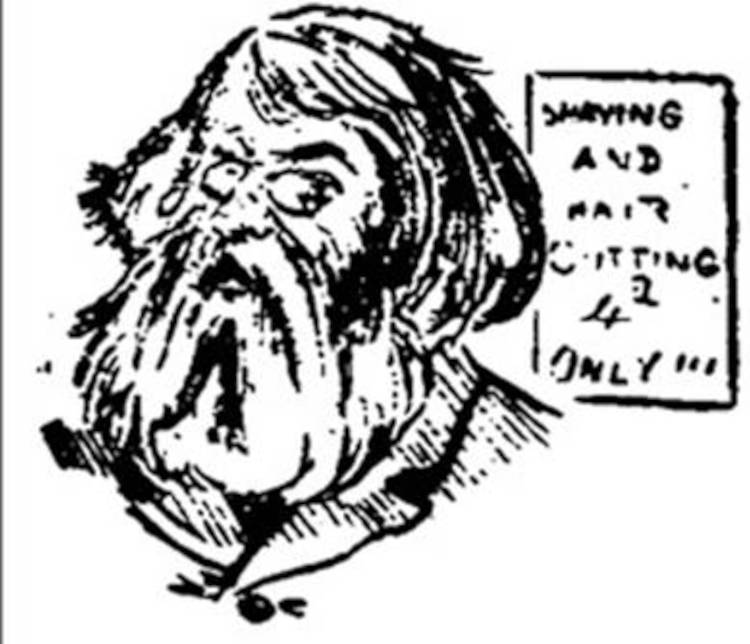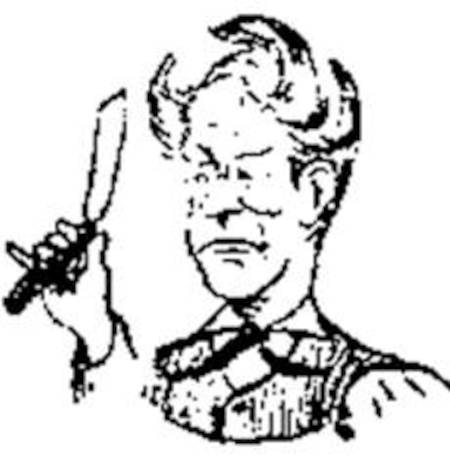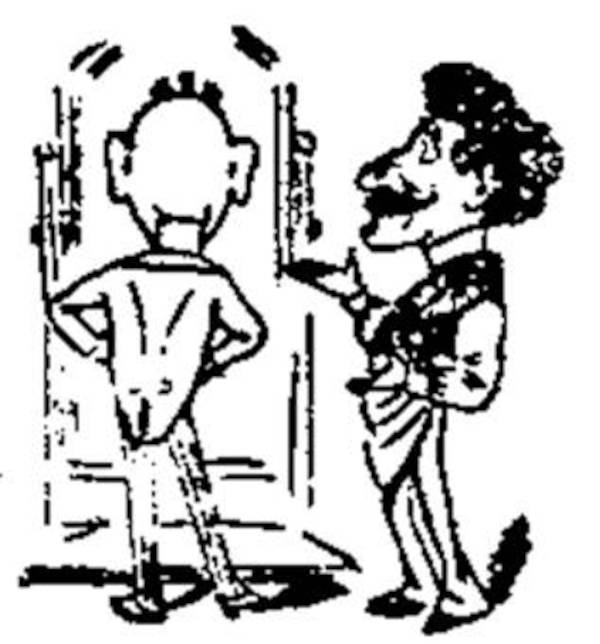This article has been transcribed from a copy of the Cardiff Times in the online collection of scanned Welsh newspapers 1804-1919 in the National Library of Wales, with grateful recognition of the free access accorded to all readers. Paragraph breaks have been introduced for easier reading.
An fine example of Victorian humour, full of excruciating puns, but describing barbershops more-or-less as they were for the next hundred years. We are in a modern world of marketing, in which useless products and services are talked up extravagantly. A hair-brushing machine, which Punch covered enthusiastically, was patented in 1862 by Edwin Gillard Camp of Bristol, and numerous patents for similar machines were issued in Britain and America in following years. Samuel reports on the latest technology, and even suggests some automatic devices of his own. See for example no. 2, 11th December 1886, ‘Electrical Inebriate Guide’; no.57, 6th October 1888, ‘Samuel on Automatic Machines’; no. 61, 3rd November 1888, ‘Samuel on Some Things that Ought to be Invented’; and no. 180, 23rd May 1891, ‘Samuel on Telephones‘. — David Skilton

An argumentative barber, one who ‘nose’ too much.
It was formerly the office of barbers in this country also to act (as they now do in certain foreign countries) as phlebotomists (no extra charge for that word), blood-letters or bleeders, and I am sorry to say that in some instances they have not yet forgotten this phase of their craft – very much craft sometimes. But I anticipate, as novelists say. Possibly, the reason why barbers usually assume a superior air of dignity in their estimate of their own occupation is that budding youth (which considers it eminently dignified to be shaved) has paid them an abnormal degree of deference. In these cases I may say that a well-known Eastern metaphor (a metaphor you will doubtless have met-afore) aptly applies, and that the barber does in the most literal sense ‘laugh at the beards’ of the fond youths. By the way, sir, perhaps you do not know why beards and moustaches are grandiloquently styled ‘hirsute appendages’ by many. Well, sir, the ladies are notoriously fond of moustaches, and these were originally called ‘her suit’ ornaments; but, by a perversion, the words is now rendered ‘hirsute.’ I have had much experience of barbers, sir, and I have had much leisure to study their manners and customs, this leisure being afforded when I have called to be shaved; and, seeing about seven men with eight days of beard upon their respective cheeks, have been told that I was next but one in turn. I have never yet been anything but ‘next but one’ in the order of succession, though I have thereafter waited for about forty minutes many a time. There is generally a man who is having his hair cut in the way. He is cut by easy instalments, and there is suppressed rage indicated by the violent distortion of his visage every time the cutter of hair leaves his head for someone else's chin. And, oh, what original opinions anent the popular themes of the day have I not heard enunciated whilst I have been waiting to be shaved. By-the-way, may not this fact afford an idea to our topical vocalists who are for singing to such refrains as ‘What I heard as I stood on my head,’ ‘What I said as I sat on a tack,’ and so on? Let them try such a refrain as ‘What I heard at the barber's shop,’ and all their male auditors will instantly recognise the naturalness of the notion.

Plenty of work for the money
It is seldom, sir, that barbers are men of a contradictory disposition; this will instantly be seen by their acquiescent manner to customers who express widely divergent opinions. Were a barber's customer (perhaps I ought to say ‘client’), for instance, to say that he had always entertained an opinion that the moon was made of green cheese, I do not suppose that a barber would contradict him – especially if the said customer kept a shaving pot and brush at the shop at so much per week, on the contract plan. The barber would not by any means suggest that the customer should have his head shaved, he would in all probability say, ‘Do you think so, sir? would you like a shampoo, sir?’ It seems, sir, as the soap, of which he uses such quantities, had entered his very soul, and that he could not help ‘lathering’ his customers. Of course, I would not have him of a bellicose and argumentative disposition, for he might, were he a violent Tory or Unionist, say, take it into his head to sIit the wizens of assertive Home Rule customers, or to treat them a la Sweeny Todd, a most notorious member of his profession.

An argumentative barber, one who ‘nose’ too much.
I never knew but one argumentative barber, and he, in making a cutting remark, nearly cut a customer's nose off. But though the barber readily enters into the sentiments of his customers, he is otherwise somewhat haughty and unbending. He seems to derive the dignity all men else instantly and instinctively Iose, when they are told that it is ‘their turn next,’ and when they place their heads and necks in his temporary keeping. ‘No man is a hero to his valet’ has been very truthfully said [by Anne-Marie Bigot de Cornuel (1605–1694)], and it is an assured fact that no man is a hero to his barber. What, sir, can be more lowering to one's amour propre, than to be seized by the barber's boy, who, so to speak, enwraps one in the ‘bib of childhood – and who, in doing so, and sticking the folds of the wrapper in what is vulgarly called one's ‘neck hole’ actually tickles one. Oh, those barbers' boys, what a legion of them I have had painful experience of. Judging barbers' boys as a class, I should say that their main characteristic was that they all smell of scented hair-oil, that they all stand expectant of ‘tips,’ and the locks of every one of them appear to have been laid down with a flat iron in all the parts except where the forelock occurs. This forelock either stands erect like the quills of the proverbial porcupine of a fretful disposition, or it is arranged into a very even and unnatural sort of curl, which reminds one of a well-behaved wave at the sea-side, or a cake of ‘ginger-snap.’ No doubt the hair of the barber's boy occupies the main portion of such leisure as he may enjoy. The only thing that puzzles me is that he does not completely brush himself out of existence. I have known barbers' boys who displayed such intelligence in the lathering process that they seemed to desire to completely wipe one out. I have known others of a palpably spiteful and malicious disposition, who appeared to regard the customers as their enemies, and who accordingly vented their juvenile spleen upon the latter by lathering them up their nostrils, in their ears, in their eyes, up to the very roots of their hair, in fact. They seem to desire to lather the roof of one's mouth, as though they thought that one's moustache had grown through. Sometimes a barber's boy has hands which suggest that he had been playing at Christy minstrel and has forgotten to remove his war paint; sometimes, especially when one is in a hurry, he lathers one at painful length before he says ‘ready’ to his master, and very often he rubs at one's face with his open hand as though he were slapping one

Appears to have got ‘em.
For barbers themselves, sir, their methods of operating upon one's visage and upon one's poll are as diverse as is the handwriting of different beings. Regarding shaving, some of them seize one violently by the nose, as though they meant to be personally offensive; others nearly smother one by casting a huge hand all over one's features; others seem to have obtrusive and unmanageable thumbs, which they appear to desire to ram forcibly down one's throat; others keep on ‘slabbing’ (pardon the word) one's head from side to side; others are exceedingly finicking, and touch one as though they desired to have no further contact with you; others go over the same ground with their razors as though they liked one so much they couldn't leave; others weave their razors about, round one's head with many flourishes, as though they hadn't quite decided whether to shave or to decapitate you – a really good shaver is indeed a rarity. Oh, what a terrible mockery it is, sir, when a veritably barbarous barber is hacking away at one, and then placidly inquires, ‘Is the razor easy sir?’ I always feel inclined, under such circumstances, to procure a red hot brick, to rub the barber all over with it, and then to polish him off with salt, and to ask if I ‘shave easy.’ Other barbers there are, sir, who appear to make onions and rum their speciality in the way of refreshment, and there are a vast army of them, too, I am sorry to say, whose digits during the earlier part of the day seem to be of opinion that they are so many ballet girls and ought to dance paralytically with the razor round your throat. In these latter cases, you make up your mind that your barber belongs to the ‘blue ruin’ [illicit gin] rather than the ‘blue ribbon’ army [Temperance League]. When they happen to slice off a bit of your nose instead of a portion of a three-days' moustache, they always ascribe the blame to you, and allege that you distinctly sneezed, and then they proceed to fix on the tip of your proboscis with cotton wool, lather, and postage-stamp edging. In these cases, I always think of having a ‘brush’ rather than a shave with the enemy.

’air slightly reedooced, sir? Yes, sir?’
I have not referred yet to the very swell barbers — the superfine gentlemen who refer to themselves as ‘Artistes in Hair,’ Hairdressers, and the like; the gentlemen who affect puffed sleeves and a good deal of Frangipani and other strong perfumes. Their very style of address is ultra-refined, sir. If you visit one of them in order to be shaved, he very politely says, as though he had known you all his life, and wished to pay you special deference, ‘Good morning, sir; be seated, sir,’ and he hands to you one small portion of a daily paper – probably the advertisement sheet. Be it here observed that you seldom get a full copy of any given paper at a barber's; such journal is neatly divided into separate sheets to different customers. Then the grandiloquent member of the craft will ask you, ‘Will you have your ‘air slightly redooced, sir?’ If you say no, you don't want your ‘air redoosing, he will say, ‘'Ave your 'air dressed, sir?’ The best reply under such circumstances is, ‘Were you ’air- dressing me?’ If you are distinctly bald, he will, it is very probable, euphemistically remark that your ‘air’ is slightly ‘thin’ at the top, and he will recommend his infallible ‘Anti-balderini Balm,’ or his ‘Cranio-crop Producer,’ at seven shillings the two ounce bottle. Although I have heard nostrums of this sort repeatedly recommended, I cannot conscientiously say that I ever saw any man purchase any of them, though methinks that the artist in hair must sometimes be rewarded. Possibly the men who make such purchases do so furtively and by night, lest they should be observed by unsympathetic scoffers. I will only make passing reference to ‘hair cutting and brushing by machinery’ men; suffice it that, so far as I am concerned, I would rather submit myself to having my locks clawed at by a wild Indian on the war-path or two irate fishfags than render myself up to the hair-brushing machine.

A capital crop for only eleven bottles, si.
It must not be gleaned from all this that I wish to disparage barbers. They may say that such is my object, and ask, ‘Why don't you cut your own hair, or have it cut by your wife?’ To this query I can only reply that I don't care to do gymnastic feats, and that Mrs Samuel has a more effective method of dealing with my hair than cutting it. The indignant barber may also ask, ‘Why not shave yourself?’ Let me say, in answer to this, that my own method of shaving combines all the worst features of all the collectively bad shavers who ever did butchering business upon me; also let me say, ‘Catch me at if you can.’ When I have chanced to attempt to shave myself, my face has looked as if it had been passed through a sausage meat-mincing machine. I will concede many merits to barbers. First of all, they don't like other male beings taking hairs upon themselves; then, by scissors, they can always razor bit of money with the great instruments of their business; they can always live on ‘stray;’ they always know the exact state of the poll both at election and other times; they are mostly strapping fellows and nice shavers; if they gamble, they will always go for heads; they are always comme il faut; you never can beard them unless they choose, and they ever cut their way to fortune. I am afraid that they won't accept these honestly tendered remarks though they are, but will literally try to give me a ‘brush up’ whenever I place myself in their power after this.
Last modified 23 January 2022